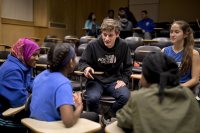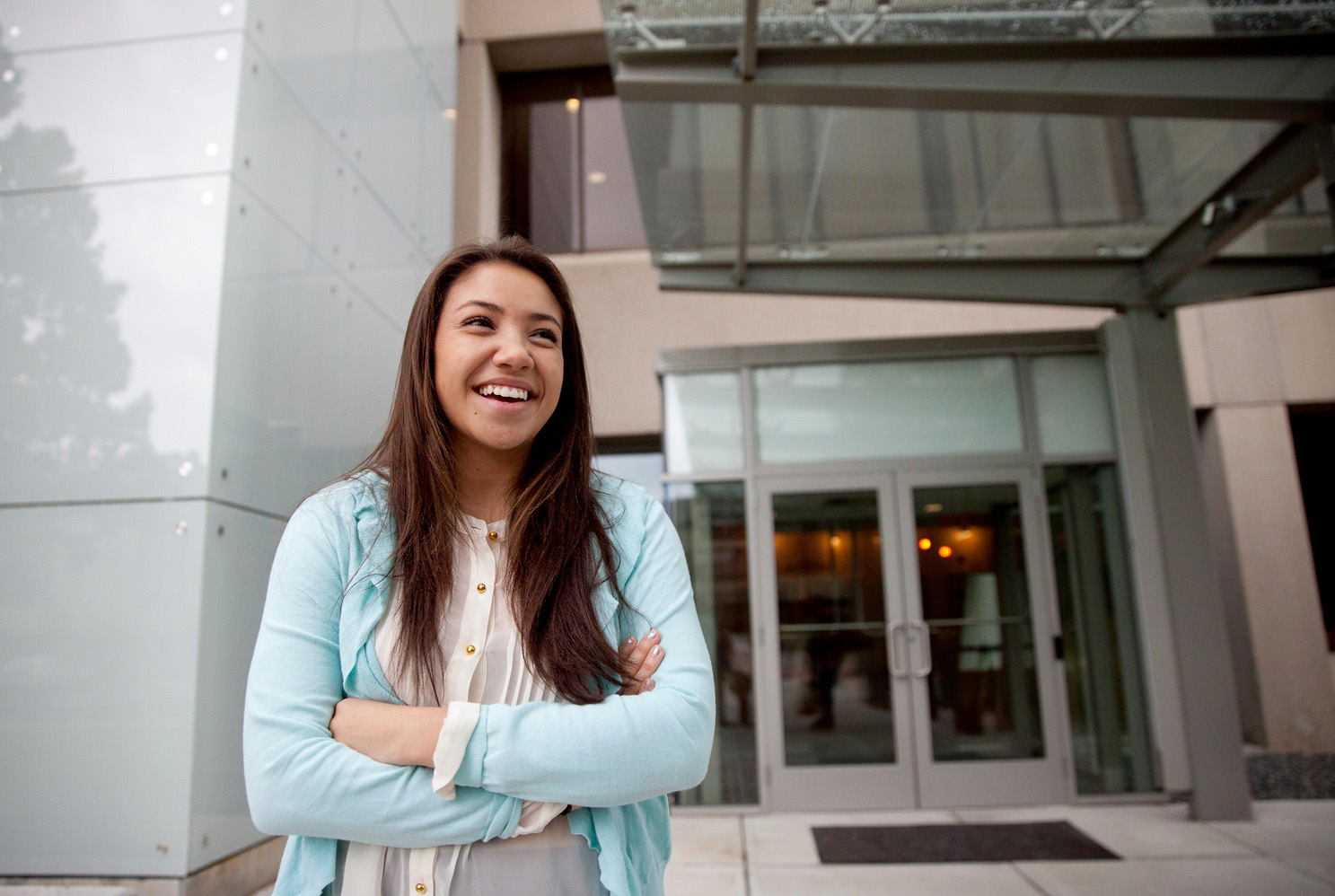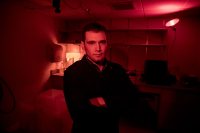
Student meets Nobel winner at Off-Campus Study Consortium
As if spending a semester in London isn’t exciting enough, a Bates College junior from Northeast Harbor also had the opportunity last month to meet one of this year’s recipients of the Nobel Prize for medicine – just two days after the award was announced.
Jessica Walls, a biology major, belongs to a cellular biology course offered at the London branch of the Colby-Bates-Bowdoin (CBB) Off-Campus Study Consortium this fall. The class studies cell growth and division and how these processes relate to cancer. Last July the course leader, Colby College biology Professor Paul Greenwood, invited English cancer researcher Tim Hunt to come to the CBB London Centre to discuss his research.
On Oct. 8, two days before Hunt’s scheduled appearance, the Nobel Assembly selected him and two others to receive the Nobel Prize for medicine. A principal scientist for the Imperial Cancer Research Fund (ICRF), Hunt specializes in the molecular mechanisms that control cellular growth and division. Sharing the award were Hunt’s ICRF colleague, Paul Nurse, and Leland Hartwell, of the Fred Hutchinson Cancer Research Center, in Seattle. The three were honored for a series of discoveries, beginning in the 1960s, that have greatly advanced scientific understanding of the cell cycle.
With all the hubbub, no one was too surprised that Hunt was less than meticulously prepared for his talk at the Centre. “Tim arrived about ten minutes before his talk was scheduled to begin, looking slightly disheveled,” writes Walls. “He whipped out a few slides and, without any desire for some sort of grand introduction, started talking to us.” There were 17 CBB students present – in addition to the Bates six, one from Bowdoin and the remainder from Colby.
“His presentation was really informal, which was perfect because it made the presence of a ‘brilliant Nobel Prize winner’ a little less intimidating,” Walls continues. “It was also extremely engaging. His research is incredibly relevant, in fact critical, to cancer and the aspect of cell-cycle control.”
Best of all, adds Paul Greenwood, Hunt “talked about some brand-new things that are out. The students were very excited about that, because they knew they were basically hearing this stuff before anybody else was.”
Walls and Greenwood agree that Hunt’s modesty about the Nobel, despite his obvious excitement about it, was disarming. “He just considers himself ‘a lucky guy’ – that’s the term he used,” Greenwood says. “But then of course he gave his talk, and you realized that he isn’t just a lucky guy, but a really smart scientist,” he laughs.
After Hunt’s presentation, the session continued informally over wine and cheese. Hunt talked about being measured for a robe for the Nobel ceremony and – since all but one of the students in the class are women – about career opportunities in biology for women. He also autographed a copy of one of his publications.
“He very willingly jumped right into the middle of our class picture,” Walls recounts, “and then used a student’s cell phone to call his wife and tell her he was on his way home for dinner. I mean, he was a very real person.”
The opportunity to schmooze with Nobel laureates is not an advertised benefit of the off-campus study program, but there’s no question that study abroad adds a unique dimension to the educational experience. For students from all three colleges in the CBB Consortium, it affords exposure to the top experts and research facilities in a given field. London, says Greenwood “is a top area for the biomedical sciences.” (Last July, when he engaged Hunt, Greenwood also invited Paul Nurse to speak, although he had to decline.)
Beyond specific fields of study, a semester off campus gives students insight into both the host culture and their own. “Students learn about American culture when they view it from the outside,” says Stephen Sawyer, associate dean of students and director of the Off-Campus Study Program at Bates. (Other CBB centers are in Cape Town, South Africa and Quito, Ecuador.)
Four of the Bates students studying abroad in the CBB program this semester are Maine natives: Brendan Ferriter, of South Portland (Cape Town); Sophia DeMaio, of Orono (Ecuador) and Nicholas Christie, of Winthrop, who like Walls is at the CBB London Centre.
The program also benefits faculty, Sawyer explains. It helps them strengthen their own expertise, and there’s the “advantage of getting the faculties of the three colleges to interact more and build relationships in their fields.”
Students, too, “meet students from the other colleges as friends rather than as competitors,” Sawyer says.
Walls can vouch for that. “There’s not a lot of differentiating between colleges or even between students and professors,” she says. “The chemistry is great.” Not to mention the cellular biology.




